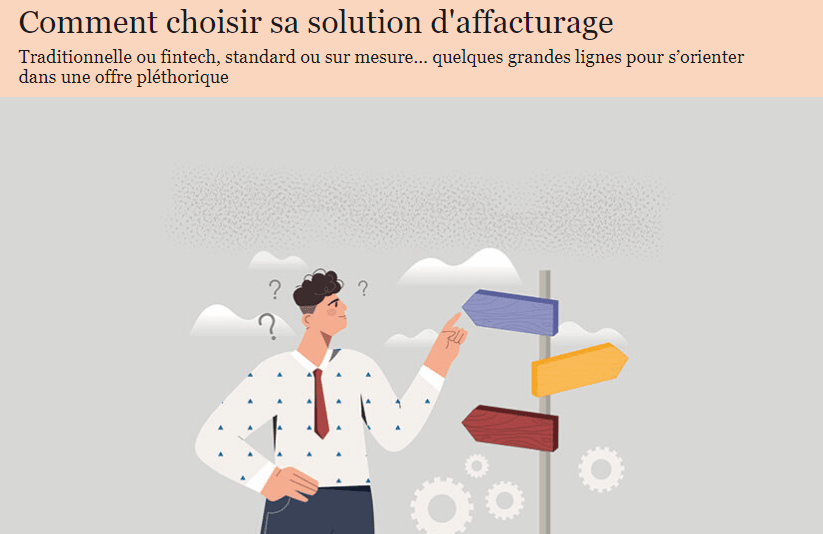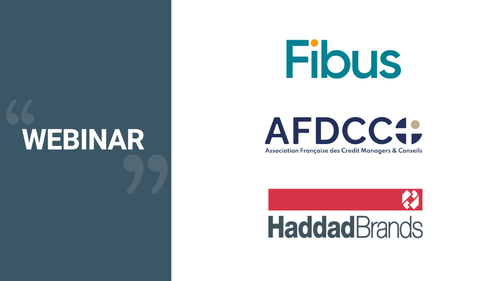How to choose the right factoring solution ?
Traditional or fintech, standard or tailored… here are some key insights to help you navigate a vast array of options. Read the article from Le Nouvel Économiste for a clearer understanding of the different factoring financing solutions available.


Despite a slight decline in recent months, factoring remains a popular choice for companies looking to quickly access liquidity. To achieve this, they transfer the management of their receivables to a factor, to whom they may also delegate various tasks. However, finding the solution that best fits their needs in such a crowded market is essential. Depending on their size (large corporation or SME) and market (domestic or international), different companies will have different priorities. From bespoke solutions to standard options, online services, or in-person teams, everything is possible if a few key points are considered carefully.
According to the French Association of Financial Companies (ASF), over 32,500 companies in France used factoring in 2023, a decrease of 1.4% compared to the previous year. This means they entrusted certain tasks to a third party—called a factor in industry jargon—so they could focus on their core business. These tasks typically include receivables management, liquidity financing, and/or the recovery of unpaid invoices. Unsurprisingly, there is a wide range of factors available, eager to help companies needing to finance their operations. Factors generally fall into two categories: traditional factors (banks, bank subsidiaries, financing companies, or independent firms), which have dominated the market since the 1960s, and newer, digital-only fintech factors.
According to the French Association of Financial Companies (ASF), over 32,500 companies in France used factoring in 2023, a decrease of 1.4% compared to the previous year. This means they entrusted certain tasks to a third party—called a factor in industry jargon—so they could focus on their core business. These tasks typically include receivables management, liquidity financing, and/or the recovery of unpaid invoices. Unsurprisingly, there is a wide range of factors available, eager to help companies needing to finance their operations. Factors generally fall into two categories: traditional factors (banks, bank subsidiaries, financing companies, or independent firms), which have dominated the market since the 1960s, and newer, digital-only fintech factors.
"Traditional factoring solutions tend to be more cost-effective but less flexible."
However, Antoine de Chabot, head of the Financial Services and Investment sector at ASF, argues that this distinction is outdated. "Innovation has always been a part of the factoring industry, and factors have continuously been proactive in digitization since the 1990s," he says. Marc Balaguer, Commercial Director of BNP Paribas Factor, which has been offering factoring solutions for over 30 years, shares this view. He acknowledges the positive impact of these new entrants on driving further innovation. "They pushed us to accelerate the digitization of our processes, from contract signing to daily operations," he explains.
Cost vs. Flexibility
Still, it’s not easy for companies to determine which factor to choose. Among the essential criteria is, of course, price. According to Raphaël Kakon, CEO of Dimpl, his commercial receivables financing solution, launched in early 2023, might be more expensive than traditional players. "Our offering is more costly than contract-based, volume-committed options because it’s tailored, on-demand, and à la carte," he explains.
This is a trend across the industry: traditional factoring solutions are often more attractive from a cost perspective but lack flexibility. Fintech factoring firms, like Dimpl, are aware of this and typically focus on small and medium-sized enterprises (SMEs), which often require more specific support. Traditional factors, on the other hand, emphasize their ability to meet the needs of all types of businesses, from small firms to large corporations.
This is a trend across the industry: traditional factoring solutions are often more attractive from a cost perspective but lack flexibility. Fintech factoring firms, like Dimpl, are aware of this and typically focus on small and medium-sized enterprises (SMEs), which often require more specific support. Traditional factors, on the other hand, emphasize their ability to meet the needs of all types of businesses, from small firms to large corporations.
In-person or Remote: Support Is Key
Factoring providers unanimously agree on one point: comparisons shouldn’t stop at pricing. "You need to find the right balance between the contract and the quality of service," emphasizes Gladys Teale-Moulines, Client Relationship Director at Crédit Agricole Leasing & Factoring, a subsidiary of the group specializing in leasing and factoring. What may favor traditional providers is their ability to offer face-to-face meetings through physically present teams. "Each of our clients has a dedicated account manager," adds Marc Balaguer, a way to build trust and close relationships. The same goes for Crédit Agricole Leasing & Factoring. "Our client managers know their customers well and stay close to them. Our goal is to adapt to their needs with local or multilocal solutions," says Gladys Teale-Moulines.
"The lack of physical presence is not a barrier to a good customer experience. Online factors compensate with interfaces designed to be as intuitive as possible."
However, the absence of physical presence doesn’t necessarily hinder a good client experience. Online factors make up for this with user-friendly, intuitive platforms that aim to minimize problems and unnecessary interactions. For instance, on Dimpl, clients don’t need to upload invoices to the platform; they just need to CC the team in their billing emails, simplifying the process. "We are very mindful of our responsiveness," adds Raphaël Kakon, aware that companies need quick answers in case of questions or issues.
A new decline in factoring at the start of 2024
Other criteria may also influence the decision-making process, such as the financial stability of the factor, its ability to adapt to business changes, or its capability to support international operations (see sidebar). Each company must establish a list of key priorities and compare the offers from different factors.
Factoring remains the primary source of short-term financing for businesses, ahead of overdrafts, even though the activity has been in decline since late 2023. Between January and March 2024, the activity of French factors experienced a further drop (-2.6% to €100.9 billion) for the third consecutive quarter, according to ASF data.
This decline comes after a decade of double-digit annual growth for the sector (excluding the COVID period). It is affected by high interest rates, the economic and political climate, and more cautious business management. However, one thing remains certain for Marc Balaguer: "Companies will always have high working capital needs, and, therefore, factoring will remain essential."
Factoring remains the primary source of short-term financing for businesses, ahead of overdrafts, even though the activity has been in decline since late 2023. Between January and March 2024, the activity of French factors experienced a further drop (-2.6% to €100.9 billion) for the third consecutive quarter, according to ASF data.
This decline comes after a decade of double-digit annual growth for the sector (excluding the COVID period). It is affected by high interest rates, the economic and political climate, and more cautious business management. However, one thing remains certain for Marc Balaguer: "Companies will always have high working capital needs, and, therefore, factoring will remain essential."
Offers tailored to Small and Medium-Sized Businesses (SMEs)
Last May, the factoring company Factofrance launched a simplified financing solution aimed at very small and medium-sized businesses (SMEs). This is actually an evolution of one of its existing products, named FactoFlex, which was already dedicated to this business category. “This approach aims to meet financing needs through a more flexible solution, better suited to their operational realities,” the company stated in a press release.
They highlighted two key new features: financing up to 100% of the value of ceded invoices, with no retained guarantee, and a single commission fee. These enhancements complement the services of a standard factoring contract: protection against customer insolvency, 100% compensation in case of non-payment, follow-ups, collections, and digital services. This offer also covers the financing of export invoices and can be subscribed without a long-term or minimum commitment. The company emphasized that it was developed in collaboration with SME leaders and their accountants, “with the goal of simplifying accounting entries and reducing their number.”
Factofrance is not the only factor offering solutions tailored to this business segment. Others have also introduced similar offerings over the years, such as BNP Paribas Factor and Crédit Agricole Leasing & Factoring. Online players like Dimpl are generally focused entirely on this segment. “SMEs have a unique profile, which is why it's important to offer them a simple and transparent solution. The no-commitment aspect is also crucial for them,” says Raphaël Kakon, CEO of the fintech company. Given that SMEs represent the vast majority of the French business landscape—over 99.8% of all companies according to INSEE—it’s only logical that factors focus on this market.
They highlighted two key new features: financing up to 100% of the value of ceded invoices, with no retained guarantee, and a single commission fee. These enhancements complement the services of a standard factoring contract: protection against customer insolvency, 100% compensation in case of non-payment, follow-ups, collections, and digital services. This offer also covers the financing of export invoices and can be subscribed without a long-term or minimum commitment. The company emphasized that it was developed in collaboration with SME leaders and their accountants, “with the goal of simplifying accounting entries and reducing their number.”
Factofrance is not the only factor offering solutions tailored to this business segment. Others have also introduced similar offerings over the years, such as BNP Paribas Factor and Crédit Agricole Leasing & Factoring. Online players like Dimpl are generally focused entirely on this segment. “SMEs have a unique profile, which is why it's important to offer them a simple and transparent solution. The no-commitment aspect is also crucial for them,” says Raphaël Kakon, CEO of the fintech company. Given that SMEs represent the vast majority of the French business landscape—over 99.8% of all companies according to INSEE—it’s only logical that factors focus on this market.
The Advantages of International Factoring
International factoring operates similarly to traditional factoring but is designed for companies with a parent company in France or the European Union, with foreign subsidiaries and/or those exporting products and services. "For these companies, factoring is a way to finance their international operations. Thanks to the non-payment protection system, it allows them to do so securely, with access to a team that understands the legal environment of the countries they are exporting to," explains Marc Balaguer, Commercial Director of BNP Paribas Factor. Antoine de Chabot, Head of Financial Services and Investment at the French Association of Financial Companies (ASF), adds: "Tailored support can include providing information prior to the contract, assistance with contract drafting and execution, or tracking receivables by country, client, and invoice."
As a result, the factor can provide details about the creditworthiness of a potential importing client, something that companies may struggle to find on their own. Additionally, the factor is typically familiar with the specific regulatory policies and currency management practices of different countries. When it comes to follow-up, language is not a barrier, and the factor knows whether reminders should be done verbally or in writing, depending on the country’s customs.
It is worth noting that the international activity of French factors slowed down in 2023. Operations declined by 1.1% over the year, while domestic factoring increased by 2.3%. This contrasts with previous years when international factoring was the driving force in the sector (excluding the COVID period).
As a result, the factor can provide details about the creditworthiness of a potential importing client, something that companies may struggle to find on their own. Additionally, the factor is typically familiar with the specific regulatory policies and currency management practices of different countries. When it comes to follow-up, language is not a barrier, and the factor knows whether reminders should be done verbally or in writing, depending on the country’s customs.
It is worth noting that the international activity of French factors slowed down in 2023. Operations declined by 1.1% over the year, while domestic factoring increased by 2.3%. This contrasts with previous years when international factoring was the driving force in the sector (excluding the COVID period).
These articles may interest you

How the Credit Manager safeguards the company’s cash flow
A function at the heart of financial stability The Credit Manager’s role extends far beyond preventing bad debt: today, they act as the true conductor of the order-to-cash process, ensuring the company maintains healthy, predictable, and actively managed cash flow. We
spoke with Thibaut Robet, CEO of Fibus, a firm specialising in order-to-cash management.
spoke with Thibaut Robet, CEO of Fibus, a firm specialising in order-to-cash management.

How can credit insurance support growth in a sector under pressure?
Economic difficulties are mounting and weighing more heavily on certain sectors: how can you make the Credit Manager a business partner who supports the company's growth? Discover the testimony of HADDAD BRANDS EUROPE in the webinar hosted by Alexia Monteillet, Credit Risk Manager at HADDAD BRANDS EUROPE, and Marc Chaquès, Credit Insurance Director at Fibus, in partnership with the AFDCC.

Factoring for LBO transactions
Deconsolidating, uncapped, quick to set up and inexpensive, factoring is the perfect financing solution to support the growth of LBO-backed companies.
- For 20 years, Fibus has been supporting private equity funds in France, the UK, Germany and the US.
- Four out of five transactions carried out for LBO-backed companies.
Contact us, so that, together, we can find the best solution for financing your accounts receivable.
Write us
